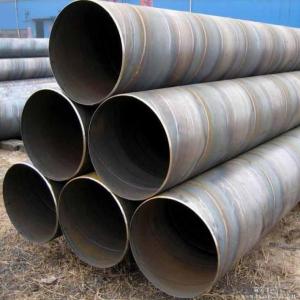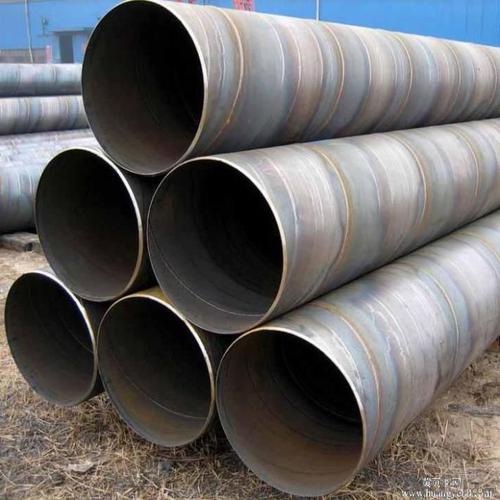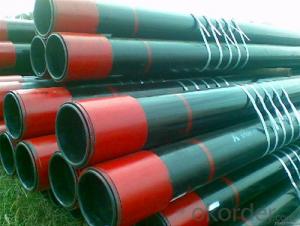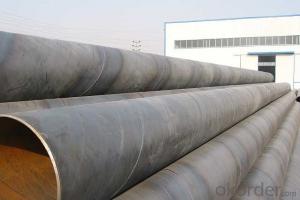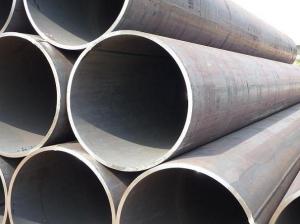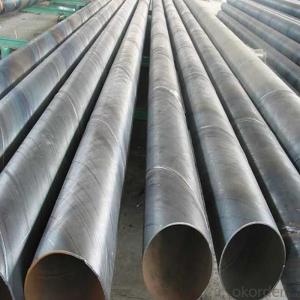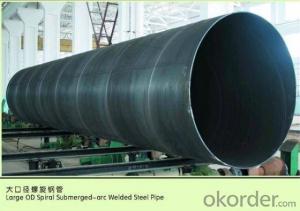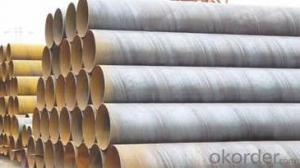SPIRAL STEEL PIPE 48‘‘ ASTM API LARGE DIAMETER PIPE
- Loading Port:
- Tianjin
- Payment Terms:
- TT OR LC
- Min Order Qty:
- 5 m.t.
- Supply Capability:
- 3000 m.t./month
OKorder Service Pledge
OKorder Financial Service
You Might Also Like
Packaging & Delivery
Packaging Detail: | standard export packing or as customer's requirement |
Delivery Detail: | within 10 - 30 days |
Specifications
Spiral Welded Steel Pipes and Tubes
1.Material:Q195-Q235
2.Length:1-12m
3.WT:1.0-14mm
4.O.D.:20-273mm
Spiral Welded Steel Pipes and Tubes
Product Description:
1.Material : Q235,Q345,L245,L290,L360,L415,L450,L485,GrB,X42,46,X52,X56,X60,X65,X70,X80,X100
2,Standard: SY/T5037-2000,GB/T9711-2011,API Spec 5L PSL1/PSL2,ASTM A252\A53,ISO3183,DIN17172,EN10217,JIS G3457,AWWA C200,ASTM A139,ASTM A671,ASTM A672
3.Wall thickness: 3.0mm-30mm
4.Outer diameter: φ168mm-3020mm
5,Length: 5m-12m or as your requirement
6,Corrosion protection standard: DIN30670,DIN30671, AWWAC210, AWWA C203, SY/T0413-2002,SY/T0414-2002
7,Application: Oil, gas, natural gas, water pipe, thermal electricity pipe, steel structure engineering, etc
Q195-q345 Material Steel Pipe's Materials
Elements | Chemical Compsition% | Mechanical Property | ||||||
C% | Mn% | S% | P% | Si% | Yield Point (Mpa) | Tensile Strength(Mpa) | Elongation | |
Q195 | 0.06-0.12 | 0.25-0.50 | <0.050< span=""> | <0.045< span=""> | <0.030< span=""> | >195 | 315-430 | 32-33 |
Q215 | 0.09-0.15 | 0.25-0.55 | <0.05< span=""> | <0.045< span=""> | <0.030< span=""> | >215 | 335-450 | 26-31 |
Q235 | 0.12-0.20 | 0.30-0.70 | <0.045< span=""> | <0.045< span=""> | <0.030< span=""> | >235 | 375-500 | 24-26 |
Q345 | <0.20< span=""> | 1.0-1.6 | <0.040< span=""> | <0.040< span=""> | <0.55< span=""> | >345 | 470-630 | 21-22 |
- Q: What are the safety precautions to follow while working with steel pipes?
- When working with steel pipes, it is important to follow several safety precautions to ensure a safe working environment. These precautions include wearing appropriate personal protective equipment (PPE), such as gloves, steel-toed boots, and safety glasses, to protect against potential hazards. It is also crucial to inspect the pipes for any defects or damage before use to avoid accidents. Additionally, workers should be trained on proper handling and lifting techniques to prevent strains or injuries. Finally, it is essential to establish clear communication and adhere to safety protocols, such as using caution signs and barriers, to promote a safe work area for everyone involved.
- Q: What is the difference between steel pipe and fiberglass pipe?
- Steel pipe and fiberglass pipe differ in terms of their material composition, flexibility, resistance to corrosion, and cost. Steel pipe is made of an alloy of iron and carbon, known for its strength and durability, making it a popular choice for plumbing, construction, and industrial projects. In contrast, fiberglass pipe is composed of glass fibers embedded in a resin matrix, resulting in a lightweight and corrosion-resistant material suitable for applications requiring chemical resistance. Another contrasting factor between steel pipe and fiberglass pipe is their level of flexibility. Steel pipe is rigid and stiff, while fiberglass pipe offers greater flexibility, allowing it to bend and conform to different shapes and contours. This flexibility makes fiberglass pipe easier to install in tight spaces or areas with complex geometries. Corrosion resistance is another significant difference between the two materials. Steel pipe is susceptible to corrosion, particularly in environments with high moisture or chemical exposure. To counteract this, steel pipes are often coated or lined with corrosion-resistant materials. In contrast, fiberglass pipe is inherently resistant to corrosion due to its construction, making it a preferred choice for applications in saltwater environments or chemical processing plants. Cost is yet another factor that sets steel pipe and fiberglass pipe apart. Generally, steel pipe is more affordable than fiberglass pipe, especially for smaller diameter pipes. However, as the diameter and pressure rating increase, the cost of steel pipe can exceed that of fiberglass pipe. Additionally, fiberglass pipe requires less maintenance and has a longer lifespan, which can offset the initial cost difference over time. In conclusion, the differences between steel pipe and fiberglass pipe can be summarized in terms of their material composition, flexibility, corrosion resistance, and cost. The choice between these two types of pipes depends on various project requirements, including the application, environment, budget, and expected lifespan.
- Q: What are the different types of steel pipe supports for thermal expansion?
- There are several different types of steel pipe supports that can be used for thermal expansion, including rigid supports, sliding supports, and spring supports. Rigid supports provide fixed support to the pipe and do not allow for any movement. Sliding supports allow the pipe to move horizontally as it expands or contracts, while still providing vertical support. Spring supports use springs to support the weight of the pipe and allow for vertical movement as well as thermal expansion.
- Q: What does the diameter of a steel pipe project mean?
- Generally, the diameter of steel pipe has three common diameters: outer diameter, inner diameter and nominal diameter.The first two are well understood.Nominal diameter refers to the national standard to specify the general diameter of a certain national standard pipe. It is only a model representation. It is neither outer diameter nor inner diameter.
- Q: How do you calculate the deflection of a steel pipe?
- To calculate the deflection of a steel pipe, you need to consider various factors such as the material properties, applied loads, and geometrical characteristics. The following steps can guide you through the process: 1. Determine the material properties: Obtain the necessary information about the steel pipe, such as its Young's modulus (E), which represents its stiffness or resistance to deformation. This value is typically provided by the manufacturer or can be found in material databases. 2. Analyze the applied loads: Identify the types and magnitudes of the loads acting on the steel pipe. These loads can include point loads, distributed loads, or a combination of both. Determine the location and orientation of the applied loads as well. 3. Evaluate the pipe's geometry: Measure or obtain the dimensions of the steel pipe, including its length (L), outer diameter (D), and wall thickness (t). Ensure that these values are accurate to achieve a precise calculation. 4. Select an appropriate calculation method: Depending on the complexity of the loading and support conditions, you may need to use either simple beam theory or more advanced structural analysis methods, such as the finite element method (FEM). 5. Apply the appropriate equations: For simple beam theory, you can use the Euler-Bernoulli beam equation to calculate the deflection at a specific point on the pipe. This equation is based on assumptions that the pipe is homogeneous, linearly elastic, and subjected to small deflections. For more complex scenarios, FEM software can handle the calculations. 6. Determine the boundary conditions: Identify the support conditions at both ends of the pipe, which can include fixed supports, simply supported ends, or combinations of both. These conditions significantly affect the pipe's deflection. 7. Calculate the deflection: Using the equations relevant to your chosen method and incorporating the material properties, applied loads, and geometry, you can calculate the deflection at specific points along the steel pipe. The deflection can be measured in terms of vertical displacement or angular rotation. It is important to note that calculating the deflection of a steel pipe may require specialized engineering knowledge and software tools. If you lack experience in structural analysis, it is advisable to consult a professional engineer to ensure accurate results and safe design.
- Q: What is the maximum pressure that steel pipes can handle?
- The maximum pressure that steel pipes can handle depends on various factors such as the grade of steel, pipe thickness, and diameter. However, in general, steel pipes can handle pressures ranging from a few hundred psi (pounds per square inch) to several thousand psi.
- Q: What are the common standards for manufacturing steel pipes?
- The common standards for manufacturing steel pipes include the American Society for Testing and Materials (ASTM) standards, the International Organization for Standardization (ISO) standards, and the American National Standards Institute (ANSI) standards. These standards cover various aspects such as material composition, mechanical properties, dimensions, testing procedures, and quality control requirements to ensure the consistency and reliability of steel pipes.
- Q: Can steel pipes be used for solar energy systems?
- Yes, steel pipes can be used for solar energy systems. Steel pipes are often used for the construction of solar water heating systems, solar thermal collectors, and solar panel mounting structures. They are durable, cost-effective, and provide the necessary support for various components of a solar energy system.
- Q: How are steel pipes protected against corrosion in marine environments?
- Steel pipes are protected against corrosion in marine environments through various methods, including the use of protective coatings, cathodic protection systems, and selecting corrosion-resistant materials.
- Q: What is the maximum temperature that steel pipes can handle?
- The maximum temperature that steel pipes can handle depends on the specific grade of steel being used. However, most common steel pipes can withstand temperatures up to around 1000 degrees Celsius (1832 degrees Fahrenheit) without significant structural damage.
Send your message to us
SPIRAL STEEL PIPE 48‘‘ ASTM API LARGE DIAMETER PIPE
- Loading Port:
- Tianjin
- Payment Terms:
- TT OR LC
- Min Order Qty:
- 5 m.t.
- Supply Capability:
- 3000 m.t./month
OKorder Service Pledge
OKorder Financial Service
Similar products
Hot products
Hot Searches
Related keywords
